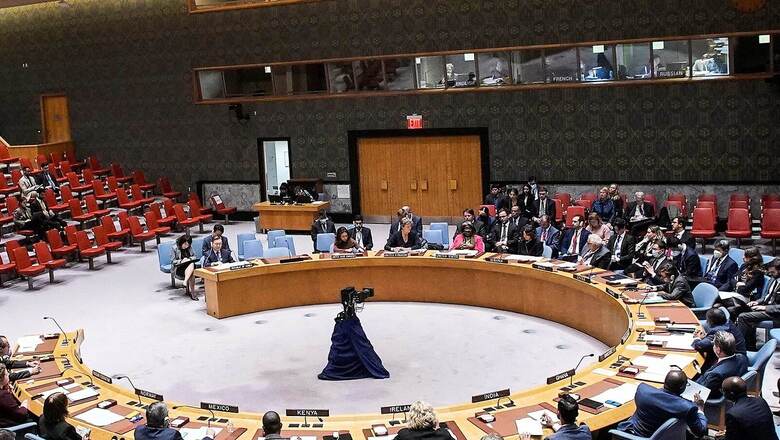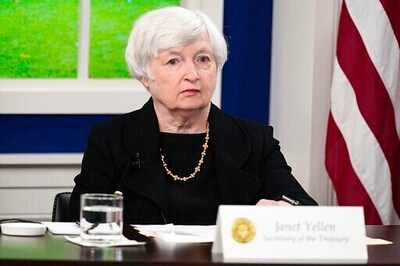
views
The recent visit of the President of the United Nations General Assembly (UNGA), Csaba Korosi, has brought back the debate surrounding India’s permanent membership in the Security Council. He was on a state visit to India from 28 to 31 January 2023. As the issue of permanent membership is political as well as legal, there is a need to understand how the UNGA functions vis-a-vis the UN Security Council reforms, at the same time, how exactly the use of veto has been misused and what is the possible way forward towards India’s claim to permanent membership.
Since the UN possesses an international legal personality and has the capacity to perform legal acts as substantiated by various provisions under the UN Charter, its organs are given the power to take decisions on a wide range of matters that results in various legal consequences for members. The UNGA, the UNSC, and the International Court of Justice (ICJ) can make binding decisions on the questions of their internal procedure. In this light, the UNGA has certain powers of decisions in the election of members of other organs. In practice, the UNGA on the recommendation of the UNSC, can take legally binding decisions on the admission of new members, recommendations, and suspend or expel a member. While these recommendations are not legally binding, they may have important legal consequences for members and in any case, are not lightly disregarded. The reform of the United Nations is possible only through the amendment of the treaty of the UN Charter. Therefore, the charter must follow the entire mechanism for amendment.
Very recently, steps have been taken by the UNGA in this regard, bypassing the resolution (A/77/L.52) that was adopted on April 26, 2022, by the UNGA requiring five permanent members of the Security Council to justify their use of the veto. This resolution was initiated by Liechtenstein three years ago, in a separate endeavour for the ongoing debate on the reform of the Security Council. This General Assembly Resolution is backed by three permanent members of the Security Council (the US, France, and the UK), except China and Russia (also called P5). The objective of this resolution is to hold the five permanent members of the Security Council accountable for their use of the veto. This resolution states that the “Standing mandate for General Assembly debate when veto is cast in Security Council” is co-sponsored by 83 UN member states across the cross-regional support. As per this resolution, the president of the Security Council convenes a meeting within ten working days after one or more members use the power of veto to stop any resolution in the Council. Further, the third paragraph of this resolution asks for a report from the Security Council to the General Assembly within 72 hours of the exercise of the veto right.
Historically, the power to use veto was derived from Article 27(3) of the UN Charter where the role of P5 in the decision-making of the Security Council is expressed. According to the article, the decisions of the Security Council on all other matters shall be made by an affirmative vote of nine members, including the concurring votes of the permanent members. Similarly, under Articles 108 and 109, P5 approval is required to bring an amendment to the Charter along with two-thirds of the members of the General Assembly. What needs to be understood is that the veto was granted to ensure that the interests of the P5 are not ignored and to ensure their participation in the UN in the aftermath of World War II. The larger issue that arises from such power is its exercise in not preventing mass atrocities and rescuing victims as seen in the ongoing Ukrainian crisis.
Despite the above obstacles, India has maintained consistency when it comes to issues concerning the maintenance of international peace and security. For example, it has immensely contributed to UN peacekeeping where the soldiers are sent not for fighting but to maintain peace, by developing the practice of sending UN observers and commissions to oversee the compliance of cease-fire resolutions. This argument is substantiated by the fact that India ranks among the fourth-largest contributors of troops to UN Peacekeeping Operations as the troops from India have taken part in some of the most challenging operations around the world and have discharged their role in the maintenance of international peace and security.
Another aspect of the UN system, to which India has contributed immensely, is with respect to the UNSC reforms that became an international agenda with the UNGA adopting in 1992 Resolution 47/62 titled, “The Question of Equitable Representation on and Increase in the Membership of the Security Council”, while deliberating upon these issues, the members generally argued for making the Council more representative i.e. the future size of the Council, the categories of membership, the criteria of membership, and the veto power.
In the midst of these deliberations, India unequivocally spelled out in clear terms, the need for reform of the United Nations, especially the Security Council, to reflect the contemporary realities of the 21st century which requires expansion in the membership of the Security Council of both the permanent and non-permanent categories, as was argued by it in 1979 before the General Assembly, to increase the non-permanent membership from 10 to 14 to reflect the democratic majority contributing to the adoption of broadly acceptable resolutions and decisions and achieve purposeful, result-oriented negotiations and parity for the unrepresented and the under-represented.
According to India, there exists a need to increase membership of both kinds, i.e. permanent and non-permanent, and to do away with the transitory measure of re-elections that were also rejected during the 1945 deliberations by majority members, as that diverts attention from the core issue of expansion and to put in place a detailed model of review to ensure the accountability of the permanent members. However, the Security Council continues to exist with the old composition of having five permanent members under Article 23 of the Charter with extraordinary powers, without putting in place any criteria upon which they have been granted such membership and who also possess the veto power on substantive matters of peace and security.
Going forward, what India as a member state must do is use the long tradition of its civilisation, its history and contributions towards the UN system, and its growing stature in the emerging world order to its advantage for its claim towards permanent membership.
Abhinav Mehrotra is Assistant Professor and Dr. Biswanath Gupta is Associate Professor at OP Jindal Global University. The views expressed in this article are those of the authors and do not represent the stand of this publication.
Read all the Latest Opinions here




















Comments
0 comment